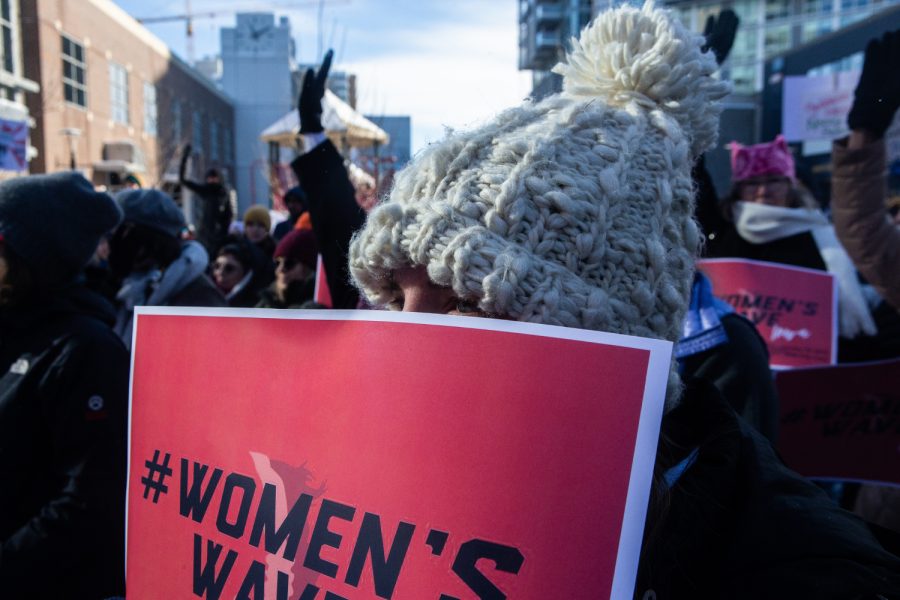An attendee listens to a speech during the Women’s March in Iowa City on Saturday, January 19, 2019. The Women’s March is an annual event that started in 2017 following the inauguration of President Donald Trump. The march advocates for a range of issues including women’s rights, healthcare reform, LGBTQ+ rights, and environmental issues.
Point/Counterpoint: Should the Women’s March be an applauded movement?
Two columnists discuss whether the Women’s March should be celebrated for empowering women or avoided due to allegations of discrimination.
January 22, 2019
I could not march
As a woman who is an avid supporter of women’s rights, reproductive rights, environmental protection, and LGBTQ rights, I could not get myself to participate in the Women’s March this year.
The Women’s March has turned from a positive and empowering movement into an exclusive movement with some anti-Semitic sentiment. An injustice occurs when a movement that should be inclusive and uplifting makes me, a Jewish woman, feel like an “other.”
Tamika Mallory and Carmen Perez, co-chairs of the Women’s March movement, said they condemn anti-Semitism. However, actions speak louder than words. Mallory attended a Louis Farrakhan rally, the leader of the Nation of Islam, where Farrakhan preached about Jews saying, “The wicked ones in the Jewish community that run America, run the world, own the banks … they are my enemies.” Not only did these words spill out of Farrakhan’s mouth, but the hatred in his tone emphasized his deep despisement of Jews. While Mallory explicitly said she did not agree with many of Farrakhan’s remarks, she refused to denounce him.
I cannot help but question why Mallory, a leader of an inclusive, progressive, and anti-racist movement would refuse to denounce Farrakhan.
I question those leaders of the Women’s March movement who think Jewish people are not part of a minority group but somehow hold white privilege. Clearly, this is not the case, considering 11 Jews were murdered in a Pittsburgh synagogue in 2018 solely for being Jewish, highlighting how prevalent anti-Semitism is today.
There is a blatant double standard when minority groups in the United States are treated one way, but Jewish people are treated another way. The Women’s March movement seems on the fence for its genuine inclusion of Jewish women as a minority group, and because of that, I could not march in or support this rally.
The Women’s March must keep its momentum against discrimination
Thousands of women and men flooded the streets of cities spread across the United States to participate in the Jan. 19 Women’s March, which started in 2017, just days after President Trump’s inauguration. Holding signs stapled with messages of unity and change while honing their resilient voices, women brought with them an air of determination to be heard. And it worked.
Since 2017, the #MeToo movement has prompted allegations of sexual misconduct to be taken more seriously than ever before. This year, a record-breaking number of women belonging to both Democratic and Republican parties have been elected into office. And change continues to shake our country.
And so, it was crucial that the crowds continued to show up just the same this year, despite the allegations circling discriminatory comments from a single co-chair member. The overall message of the Women’s March prevails against a single woman’s wrong and hurtful words. Women unifying beneath discrimination and hate is exactly the miracle of this movement.
This march is about women fighting together, side by side, raising flags and voices against squandered freedom, seeking equality and empowerment for all. This movement is bigger than discriminative statements because the sole purpose of this movement is to stand together against such statements — regardless of religion, socioeconomic status, or race.
“The mission of Women’s March is to harness the political power of diverse women and their communities to create transformative social change,” according to the Women’s March website.
If a co-chair of the Women’s March can’t exemplify this statement, then at least the thousands of women and men marching on Jan. 19 can, using this devastating circumstance as further fuel to carry on, keep the conversation going and continue fighting for equality for all women, everywhere.


